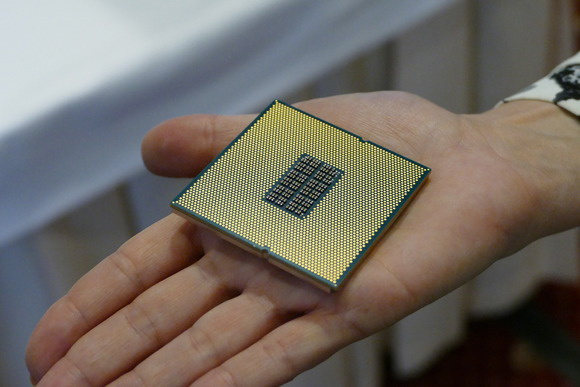It looks like Qualcomm is getting competitive with Intel in the server market by launching the ‘world's first' 10nm FinFET Centriq 2400 CPU featuring 48-cores. Qualcomm is primarily aiming this processor at datacenter use and the first 48-core samples are ready. The Centriq 2400 is the second generation of Qualcomm's server ships and they have already managed to accelerate to 10nm fabrication.
Qualcomm has been working on this particular CPU for a few years now, which features up to 48 ARMv8-compliant cores. This chip being based on 10nm could end up being quite a blow to Intel, which isn't expected to start delivering its first 10nm chips until mid to late 2017.

Image Credit: James Niccolai/ PC World
This news also comes a few weeks after we heard that Qualcomm would be teaming up with Samsung to bring the 10nm process to next generation Snapdragon 835 SoCs for smartphones and tablets.
“Qualcomm requires the leading edge of integrated circuit technology to deliver high performance at low power for the newest premium smartphones. We are first in 10nm IC technology for mobile, and leveraging our expertise in ARM processors and system on chip design, we are the first with our Qualcomm Centriq family of server processors to bring the leading edge to the data centre.”
These chips are still some ways off from hitting commercial lines though, as shipments aren't expected to start going out until Q2 2017.
KitGuru Says: Given Qualcomm's apparent lead over Intel, which won't have 10nm Xeon CPUs prepared for quite a while, it will certainly be interesting to see how this affects the market going into 2017.
 KitGuru KitGuru.net – Tech News | Hardware News | Hardware Reviews | IOS | Mobile | Gaming | Graphics Cards
KitGuru KitGuru.net – Tech News | Hardware News | Hardware Reviews | IOS | Mobile | Gaming | Graphics Cards



“The Centriq 2400 is the second generation of Qualcomm’s server ships
and they have already managed to accelerate to 10nm fabrication.”
In reality this is the first generation chip for production servers. The former 24 core chip was only for testing/developments purposes.
“10nm” Cavium failed with 48 cores, and Qualcomm will fail again as well. Google picked Avoton and Xeon D. So will much of the world.
Not really a blow given how arm cores and x86 arnt really in the same market space
intrested if amd “starship” vs intel vs qualcomm
Google is paying 97$ per hour! Work for few hours and have longer with friends & family! !mj152d:
On tuesday I got a great new Land Rover Range Rover from having earned $8752 this last four weeks.. Its the most-financialy rewarding I’ve had.. It sounds unbelievable but you wont forgive yourself if you don’t check it
!mj152d:
➽➽
➽➽;➽➽ http://GoogleFinanciallJobsCash152ShopProGetPay$97Hour… ★★✫★★✫★★✫★★✫★★✫★★✫★★✫★★✫★★✫★★✫★★✫★★✫★★✫★★✫★★✫★★✫★★✫★★::::::!mj152d:….,….
ARM arch? Might be good for efficieny and cheapness, but if you actually want performance and the full x32/64 arch then these are pretty pointless.
ohhhhh arm/soc chip.. aka completely useless in real world workloads.. especially in server loads
stfu
Not really threat for Intel, but for AMD Zen (erver version)
“10nm”. Unless this chip is being produced on Intel’s fabs before Intel is using its own 10nm fabs for its own chips (obviously not the case), then “10nm” Samsung/GloFo/TSMC is much closer in actual structure and performance to Intel’s 14nm. All this really does is pull Qualcomm’s office utilized process node closer to what Intel is already using. Intel 10nm will move Intel ahead again.
In terms of raw power for computing, an x86 cannot compete with a RISC processor. You should read more.
RISC is the short name for “Reduced Instructions Set”.
A RISC processor have few instructions but they are fast (sometimes only 1 clock cycle). That means that it is very fast as long as the tasks are simple but gets slower when more complicated operations are needed.
In reality it is a bit more complicated but this should clear things up.
Google is paying 97$ per hour! Work for few hours and have longer with friends & family! !mj185d:
On tuesday I got a great new Land Rover Range Rover from having earned $8752 this last four weeks.. Its the most-financialy rewarding I’ve had.. It sounds unbelievable but you wont forgive yourself if you don’t check it
!mj185d:
➽➽
➽➽;➽➽ http://GoogleFinancialJobsCash185DirectCompanyGetPay$97Hour… ★★✫★★✫★★✫★★✫★★✫★★✫★★✫★★✫★★✫★★✫★★✫★★✫★★✫★★✫★★✫★★✫★★✫★★::::::!mj185d:….,…..
And how does that relate to my post?
ARM and x86 are 2 completely different market spaces and sont really compete with each other